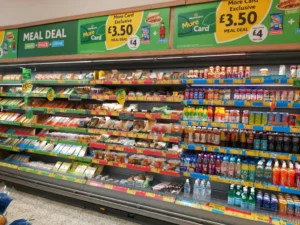Which Supermarket Is Cheapest for Weekly Shopping in 2025?
Every shopper in the UK has the same question: where can you buy everything you need for the lowest price without cutting corners on quality? With the cost of living still putting pressure on households, finding the cheapest supermarket for your weekly shop in 2025 has never been more important.
This guide compares the major supermarkets — Aldi, Lidl, Asda, Tesco, Sainsbury’s, Morrisons, Co-op, Iceland, and Waitrose — to see who currently offers the best value for money. We’ll look at real-world basket prices, budget ranges, loyalty discounts, and what kind of experience you get for your pounds.
Why Prices Keep Changing
Supermarket prices shift constantly. Supply chain costs, fuel prices, and inflation all affect how much you pay at the till. Promotions also rotate every week. That’s why no single supermarket stays the cheapest forever. Still, clear trends emerge when you compare the averages month after month. Aldi and Lidl remain leaders for low prices, but big chains like Asda and Tesco often fight back with aggressive loyalty deals. Understanding how those systems work helps you stretch your grocery budget further.
How We Compare Prices
To find which supermarket is cheapest, we use a basic weekly shopping basket that reflects what most households buy: milk, bread, eggs, pasta, chicken, fruit, vegetables, cereal, tea, coffee, and cleaning essentials. Price data varies by region, but national averages paint a good picture. We also look at loyalty-card prices, since many savings now depend on scanning your app at checkout.
The 2025 Budget Basket Breakdown
Here’s the rough average of what a typical weekly basket costs across the main supermarkets in early 2025:
- Aldi: £45.60
- Lidl: £46.10
- Asda: £48.40
- Tesco: £49.30 (or £47.80 with Clubcard Prices)
- Sainsbury’s: £50.10 (or £48.60 with Nectar Prices)
- Morrisons: £51.70
- Iceland: £52.20
- Co-op: £54.00
- Waitrose: £61.50
These figures are approximate averages from store visits, online listings, and reported price checks from UK consumer watchdogs. The differences might seem small week to week, but over a year, they add up to hundreds of pounds in savings for regular shoppers.
Aldi: Still the Price Champion
Aldi consistently comes out on top for weekly shopping value. Its model is simple: fewer brands, efficient logistics, and no unnecessary extras. Most products are own-brand, and the quality is surprisingly good. Fresh produce, bakery goods, and staples like milk and pasta are particularly cheap.
Aldi’s Specially Selected range offers premium alternatives at half the cost of big brands. While you won’t find dozens of variations of each product, you’ll get everything you need for everyday meals. Shoppers who don’t mind limited choice and want reliable quality keep Aldi at the top of the affordability list.
Lidl: A Close Competitor
Lidl’s pricing runs neck and neck with Aldi’s, often differing by pennies. Some weeks Lidl wins, other weeks Aldi does. Lidl’s advantage lies in its rotating promotions and bakery section. Many shoppers prefer Lidl’s fresh bread, pastries, and fruit quality, which slightly improves value despite near-identical pricing.
Lidl also offers a loyalty app called Lidl Plus. It gives digital coupons, scratch-card rewards, and occasional discounts on fuel and partner services. Regular users can save an extra few pounds every month, making Lidl a real challenger for the budget crown.
Asda: The Cheapest of the Big Four
Among the traditional large supermarkets, Asda remains the most affordable. It competes directly with Aldi and Lidl on basic groceries through its Just Essentials range. This budget line covers everything from bread and butter to toiletries and cleaning products, and the quality has improved over the years.
Asda’s pricing strategy focuses on variety. You can do a complete weekly shop here without missing anything. With regular rollbacks and multi-buy deals, Asda holds its own against discount rivals. For larger households who need brand variety, Asda is often the most practical balance between cost and convenience.
Tesco: Savings Through Clubcard Prices
Tesco’s standard prices are slightly higher than Aldi or Asda, but Clubcard Prices have changed the game. If you use your digital or physical Clubcard at checkout, hundreds of products instantly drop in price — often matching Aldi or Lidl levels. For example, a basket that costs £49 normally might fall to around £47.80 with Clubcard discounts applied.
Tesco also runs price-match campaigns, pledging to match certain Aldi prices on everyday essentials. Combined with frequent voucher promotions and fuel points, Tesco gives you strong overall value if you stay loyal to the system.
Sainsbury’s: Mid-Range with Loyalty Advantages
Sainsbury’s sits in the middle for price but delivers consistent quality. Its Nectar Prices programme gives digital discounts similar to Tesco’s Clubcard scheme. Shoppers who link their Nectar accounts can unlock lower prices on hundreds of products both in-store and online.
The Taste the Difference range offers excellent quality, while the Basics line still helps cut costs. Sainsbury’s may not beat Aldi or Lidl on raw price, but many families prefer it for range, cleanliness, and reliability. When you factor in Nectar rewards and personalised offers, it can compete closely with Tesco and Asda for overall value.
Morrisons: Higher Prices, Strong Fresh Food
Morrisons has higher average prices, but its quality is consistently praised. The chain sources much of its food from its own farms and production sites, giving better control over freshness. Meat, dairy, and bakery items are often a little more expensive but also higher quality.
For shoppers focused on fresh, local produce, Morrisons offers good value even at slightly higher prices. The My Morrisons app occasionally provides targeted discounts and digital coupons that help offset costs.
Iceland: Convenience Over Cost
Iceland specialises in frozen foods, which often leads to savings on bulk purchases. However, the overall weekly basket price is usually higher than Aldi or Lidl because of brand-name products and fewer budget alternatives.
That said, Iceland’s frequent multi-buy offers and free delivery on larger online orders make it attractive for families stocking up on long-life items. If freezer space isn’t a problem, it’s still a competitive choice for frozen meats, vegetables, and ready meals.
Co-op: Community-Based but Costlier
Co-op is great for convenience but rarely wins on price. Smaller store sizes and local operating costs make it more expensive per item. However, Co-op Members get access to special discounts, including weekly digital offers through the Co-op app. It’s ideal for top-up shops or urgent purchases but not the best option for a full weekly grocery run if you’re trying to save money.
Waitrose: Premium Prices, Premium Experience
Waitrose sits firmly at the top end of the scale. Shoppers pay more for high-quality ingredients, ethical sourcing, and excellent customer service. For those who value premium products, freshness, and specialty items, the higher cost can be justified. However, for budget-conscious families, it’s far from the cheapest choice.
The myWaitrose loyalty scheme does offer some member-only discounts and occasional freebies like coffee or magazines, but it won’t match the savings from discount chains.
The Role of Loyalty Schemes in 2025
Loyalty programmes have become the real battlefield for savings. Tesco Clubcard, Sainsbury’s Nectar, Asda Rewards, and Lidl Plus all offer ways to reduce costs through digital discounts and cashback points. Shoppers who consistently use these apps can save £10 to £20 per month without changing habits.
- Tesco Clubcard: Up to 50 percent off selected items weekly.
- Sainsbury’s Nectar: Personalised offers based on your shopping history.
- Asda Rewards: Cashback in “Asda Pounds” to spend later.
- Lidl Plus: Scratch-card discounts and weekly coupons.
- Co-op Membership: Weekly offers for members and local community rewards.
Using one of these loyalty systems regularly can narrow the price gap between discount supermarkets and the larger chains.
Budget Ranges That Keep Prices Low
Nearly every supermarket now has its own value line to attract cost-conscious shoppers. These include:
- Aldi Everyday Essentials
- Lidl Simply Range
- Asda Just Essentials
- Tesco Stockwell & Co.
- Sainsbury’s Stamford Street
- Morrisons Savers
Buying from these ranges can reduce your basket by up to 30 percent without major sacrifices in quality. Many of these items come from the same suppliers as big-name brands but with simpler packaging.
Where Each Supermarket Excels
- Aldi: Lowest average price for essentials.
- Lidl: Excellent bakery and fresh produce deals.
- Asda: Best large-chain prices and variety.
- Tesco: Strong discounts through Clubcard Prices.
- Sainsbury’s: Consistent mid-range value with Nectar perks.
- Morrisons: Premium fresh food quality.
- Iceland: Great frozen food deals and home delivery.
- Co-op: Convenient and ethical shopping, though pricier.
- Waitrose: Top quality but high price.
Price vs Quality: What Really Matters
The cheapest supermarket isn’t always the best for every shopper. A single person might prefer Aldi’s smaller selection and efficiency, while a large family might benefit from Tesco’s loyalty savings or Asda’s full range. Those who cook often from scratch may prioritise fresh produce quality, which makes Morrisons or Sainsbury’s appealing even at slightly higher prices. The goal is finding a balance between cost, convenience, and satisfaction.
Tips to Keep Your Weekly Shop Cheap
- Plan Ahead: Make a list before shopping to avoid impulse buys.
- Compare Loyalty Discounts: Check apps for price-matched items before heading out.
- Shop Midweek: Tuesdays and Wednesdays are quieter and often cheaper.
- Buy Own-Brand: Try supermarket alternatives before defaulting to big names.
- Look for Yellow Stickers: Evening markdowns can slash costs by half or more.
- Avoid Small Baskets Daily: One big weekly shop saves more than multiple small trips.
- Mix and Match: Do fresh items at Aldi or Lidl and top-up brands from Tesco or Asda.
How Online Prices Compare
Online grocery shopping has become more competitive. Asda, Tesco, and Sainsbury’s all offer online discounts and loyalty integration. Aldi and Lidl don’t have full grocery delivery yet, which limits convenience but helps keep prices low. Tesco’s Clubcard Prices and Asda’s digital offers are integrated directly into online baskets, meaning the savings apply automatically at checkout. Delivery costs vary but average around £3 to £5 per order, which is worth factoring in if you shop exclusively online.
Future Price Trends
Looking ahead, most analysts expect food prices to stabilise but stay high compared with pre-pandemic levels. Supermarkets are competing harder than ever to win loyal customers through apps and personalised deals rather than simple price cuts. As automation and efficiency improve, discount retailers like Aldi and Lidl are expected to stay cheapest overall, while Tesco and Asda continue closing the gap through digital loyalty pricing.
Final Verdict: The Cheapest Supermarket for 2025
Aldi holds the crown again for 2025, followed very closely by Lidl. Asda leads the big four for affordability, and Tesco’s Clubcard Prices make it a strong alternative if you use the app regularly. Sainsbury’s remains a solid mid-range choice for quality and reliability, while Morrisons, Co-op, Iceland, and Waitrose serve more specific shopper preferences.
If pure savings are your goal, Aldi or Lidl will give you the best value basket almost every time. But if you factor in loyalty rewards, online convenience, and variety, Asda and Tesco are excellent middle grounds. The smartest approach is mixing strategies: shop your basics at a discount chain, then use loyalty discounts at a full-range supermarket for the rest. In 2025, the cheapest supermarket isn’t just about price — it’s about how you shop, when you shop, and how well you use the tools available.


